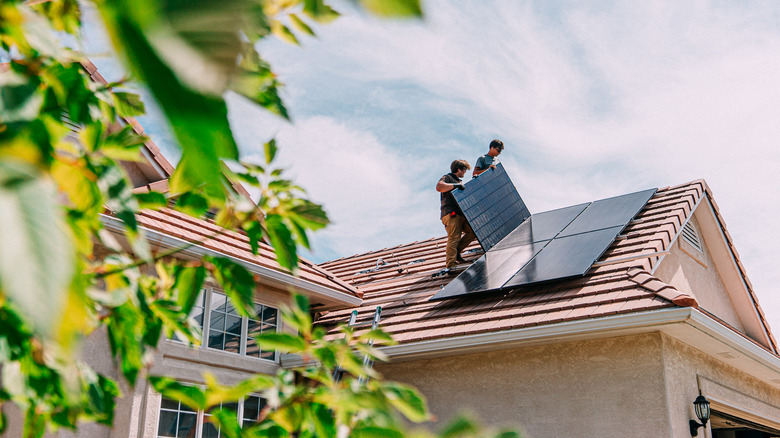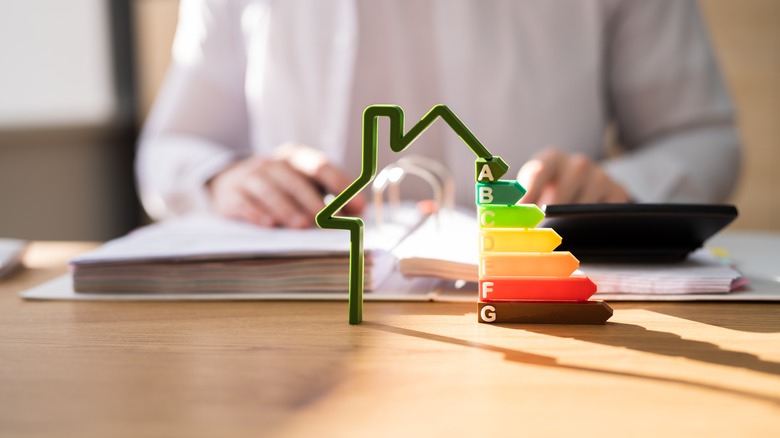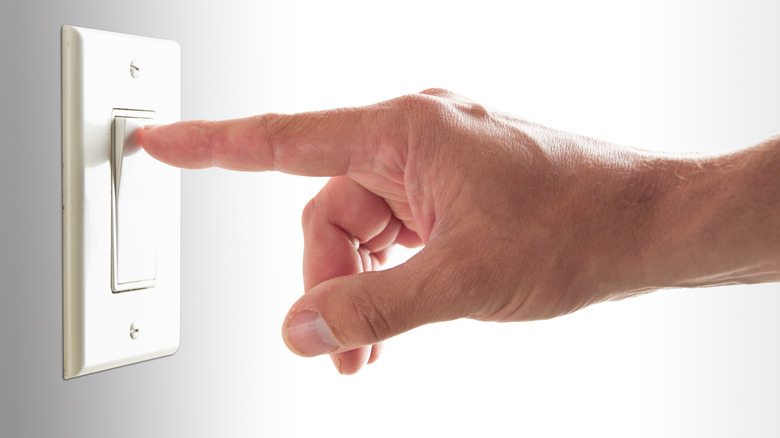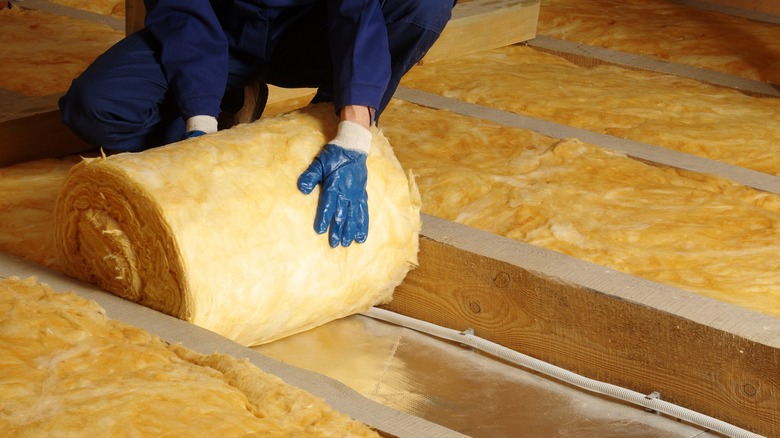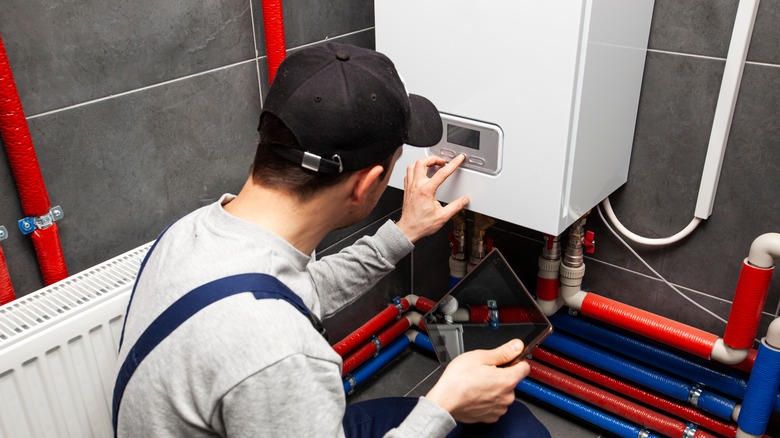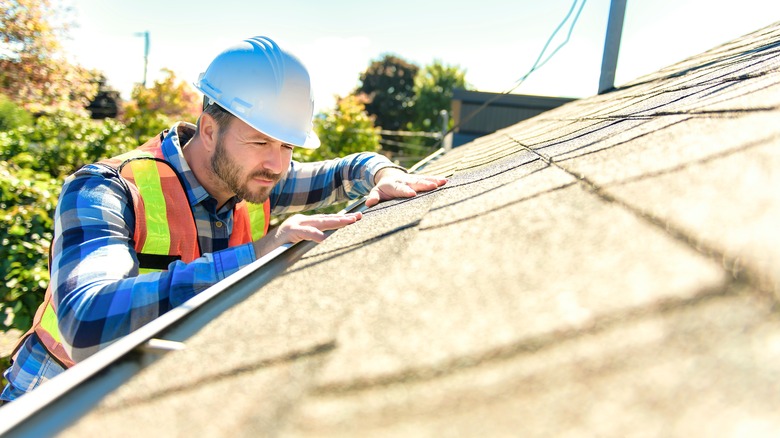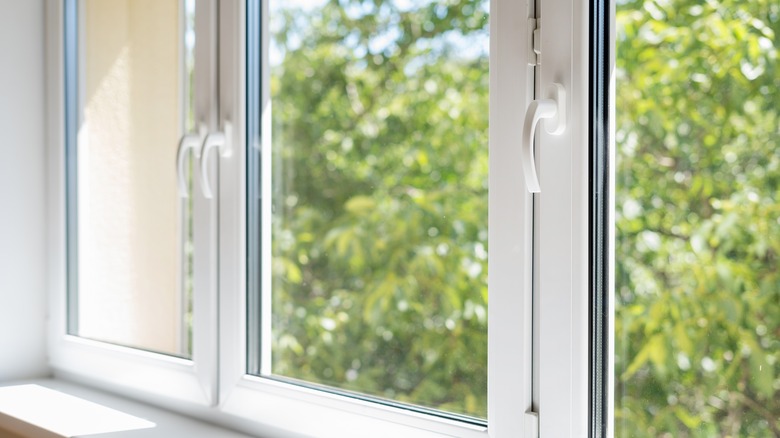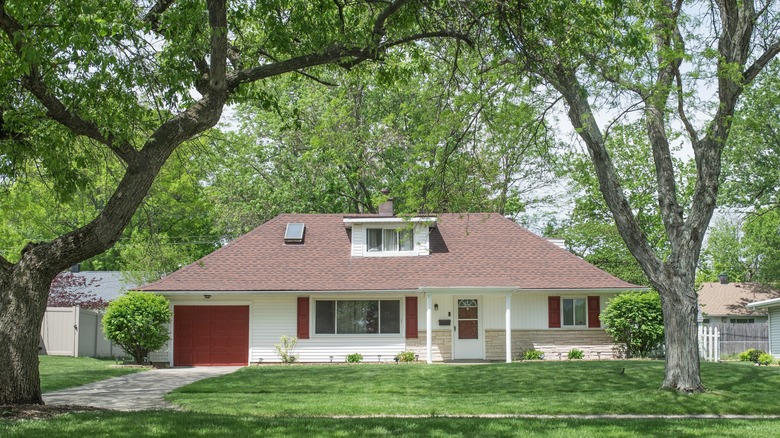9 Of The Best Home Energy Savings Tactics If You Don't Want To Install Solar Panels
Solar panels come with a great deal of benefits. The most obvious of these benefits are environmental. By switching over to a renewable form of energy that doesn't rely on fossil fuels, you drastically reduce the amount of greenhouse gas emissions you produce, which not only slows down the rapid global temperature rise but improves air quality all around. You get to be a part of the charge to limit the effects of climate change as best we can. All that being said, the benefits of solar panels are also financial. Thanks to government subsidies, the energy's renewability, and the production increase for solar, having these panels installed can mean a drastic decrease in your power bill.
While some would love to indulge in the environmental and financial advantages that installing solar panels on the roofs of their homes entails, it's not a feasible option for everyone. For those renting homes or apartments, solar panels may be off-limits because of an owner's restrictions. For homeowners, they simply may not like the aesthetics of a roof covered in solar panels or want to invest up-front costs. If they still have to rely on traditional power, that doesn't mean there aren't ways to reduce their energy bills and be more conscious about the power used. There are many different things — both big and small — that could help bring down energy consumption.
Get an energy audit
One of the best ways to determine what course of action you should take to improve efficiency should come directly from a professional, and that's why it's worthwhile to pursue an energy audit. An auditor will come to your home to figure out where your energy deficiencies occur. They will perform various tasks in your home, such as air leak tests, inspecting your equipment, and searching for issues like mold.
After determining your home's weak spots, they will then provide a list of recommendations for improvements you should make, which can either be done yourself or by contractors the auditor may recommend. Once the improvements are made, the auditor will return to perform the tests once again to judge if their effectiveness.
You can get in touch with an energy auditor through the U.S. Department of Energy, your state's energy or weatherization office, or through the HERS Index for a RESNET home energy rater. While hiring a professional is probably the best option, there are ways to perform a DIY energy audit to improve your home's energy efficiency as well.
Turn off your lights
Although it isn't the biggest piece of the monthly power bill puzzle, one of the easiest to control is your lighting. The power it takes to light your home can make up about 10% of your regular usage, and there are some ways you can reduce your lighting costs. Thankfully, none require too much of your time to alter. The most obvious and easiest way to cut down your lighting costs is to simply turn them off. Only using your lights when you need them seems simple. However, there are times when we walk into a room, turn on a light, and leave the room and the light on. It could be on for hours and serve no purpose other than to increase the power bill.
The other big way you can save on your lighting costs is by purchasing energy-efficient light bulbs, such as LEDs. So, not only would you save money by only using lights when necessary, but when they are on, they are utilizing less power, lowering your costs. Along with that, LED bulbs also last longer and are brighter than normal incandescent bulbs. If you can't get an LED bulb, there are energy-saving incandescent bulbs too, but you have to ensure you are selecting those. If you make these two simple changes, your power bill will decrease.
Turn off your devices
We are a society dependent upon our devices, and our homes are filled with them — computers, televisions, and gaming consoles to name a few. Much like the lights, we can sometimes leave these devices on for a long time when they aren't being used. Well, that is not the case. If you are using one of these devices and are done, turn it off completely rather than leaving it in sleep mode. Even if the gains are small, those times when you passively leave your computer or television on can add up over a month and eventually the year. If you boot up certain devices often, then sleep mode is fine, but make sure that it is set to go to sleep fairly quickly. For a computer, don't have it run a screensaver, as that may use a bit of power.
How you power these devices is also important. If you have a lot of devices in one place — like a gaming setup that consists of a computer, two monitors, and more — you may find yourself using a power strip due to a lack of outlets. Not all power strips are made equally, so make sure you use advanced ones that don't draw power to the device that's plugged in unless it is being used. Just this could save you $150 over five years.
Air sealing and insulation
A major issue can come from air leaks. These can be small pockets around doors, windows, and other places where the air inside your home is escaping to the outside, thus requiring your air conditioner or heating to use more power to regulate the temperature. To solve these leak issues, you first must find the leaks. Check the weatherstripping on your doors, which should be closing tightly. Check around your windows to see if they're properly sealed. Examine your lighting and electrical outlets to make sure there is no extra space from the hole in the drywall. Make similar inspections for your plumbing. Ensure the molding along your ceiling and baseboards has no cracks. Any place where a hole has been created, from a ceiling fan to a light switch, could be susceptible to an air leak. If you have found any issues, replace the weatherstripping or get some caulk to carefully seal any exposed holes.
Insulation can also be a major help. Your air conditioning system or heating won't have to work as hard, and your home will be better equipped to contain its own airflow. The Department of Energy estimates that performing these improvements could reduce your heating and cooling bill by 10-20%.
Pay attention to your A/C
The energy savings that can come from your air conditioner do not stop with sealing up all of your air leaks. Your air conditioner plays a major role in the amount of power you use, which can cause astronomical power bills. If you can't manage that effectively, you are putting a serious dent in your savings.
Although the inclination would be to turn up the air conditioning in the hotter months and turn up the heating in the colder ones, there are degrees to which you should handle this, literally. The Department of Energy recommends adjusting your thermostat at least seven to 10 degrees Fahrenheit for approximately eight hours per day depending on the temperature outside. If you are in a cold month, lowering the temperature in your home for those eight hours could do wonders for your energy bill, and the same can be said for turning up the thermostat in the hotter months. This is especially important if you are not in your home, as having a fully powered air conditioning or heating system for no one is just throwing money away.
A way to ensure you don't forget this is by having a programmable or smart air conditioning system. Of course, this assumes that your home utilizes a central air system, but being able to adjust these temperatures once so you aren't constantly needing to remind yourself to adjust your A/C could be a huge bonus.
Monitor your hot water
After air conditioning and heating costs, the second highest culprit for a high energy bill is your water heating, which takes up about 18% of your energy costs. There are some ways to reduce those heating costs. The first step in reducing your water heating costs is to lower the temperature of your water heater. Everyone enjoys a hot shower, but bringing down the temperature several degrees means that the water heater doesn't need to run as hard to get that temperature up.
Another way to reduce your costs is by using less hot water. If you take 20 to 25-minute showers in the morning, cutting that down to 10 to 15 minutes will drastically increase savings. Like with airflow in your home, insulation can also be a great tool in reducing these costs, which you can do for both the water heater itself and your pipes if they are warm to the touch. That means that heat is escaping before it even reaches your faucets, and insulation helps keep that heat where it should be.
The costly endeavor, unless you have a landlord or management company that covers your appliances, is to replace your old water heater with a newer one. By and large, these newer models will be far more energy efficient than ones made decades ago.
Think about a cool roof
Installing solar panels on your roof will make your home more energy efficient and reduce your power bills, but that is not the only way a roof can do these things. Instead of solar panels, another option a person could have would be to make the roof on their home a cool roof, with the "cool" in this instance referring to the actual temperature of the roof. A traditional roof, particularly in summer, traps heat and can reach temperatures of around 150 degrees Fahrenheit. As you might expect, that heat then comes into the home, causing your air conditioner to work overtime to try and combat it. Having a cool roof combats this phenomenon in a big way.
A cool roof is typically a lot lighter in color and made of materials that can reflect solar rays rather than absorb them. These roofs can redirect that heat elsewhere and not have it stick to your home as much, and on those particularly scorching summer days, that 150-degree number could be reduced by over 50 degrees, resulting in far less usage from your air conditioner.
Of course, if you plan to completely cover or entirely redo your roof, then perhaps it is worthwhile to make the change to solar panels. Having a cool roof still has its benefits, especially aesthetically if you like having a white or lightly-colored roof, but solar panels would be a more efficient long-term option.
Energy efficient windows
The roof isn't the only place susceptible to heightening your energy bill with the weather. While the roof causes its biggest headaches when it's hot outside, windows can be a problem no matter what the weather is like. If heat comes in through your windows, that affects your air conditioning costs. If cold comes through them, then your heating costs jump up. Having windows in your home that can better withstand outside forces can be a big cost saver for that monthly bill.
This could be as simple as replacing single-pane windows with double-pane ones, as these take a good step at isolating what is on either side of them, but the window methods go beyond that. There is also the matter of attachments and coatings that you can apply to your windows, such as exterior storm windows or coatings to reduce heat gain. You can even find windows that are gas-filled with low-e coatings for homes in particularly cold climates as they are great about reducing heat loss.
Most importantly, your windows should be Energy Star-certified windows. They come with coatings that help withstand certain climate elements. Installing these windows can reduce your heating and cooling costs by about roughly 13%, which can be hundreds of dollars annually.
Careful landscaping
One of the most simplistic forms of cooling is shade from a tree. Being able to avoid direct exposure to the sun can keep you at a temperature that is far more comfortable, which is why people outside in the hot summer months want to find the best shade. This method of cooling doesn't just work for a person outside but also a house.
If you can indulge in your home's landscaping, planting large trees in places where the sun is particularly brutal on your house could make a significant difference in your power bill. After all, if your home doesn't get as hot, your air conditioning doesn't need to run as hard. Just as you would sit under a tree to be comfortable in a park, you can give that same relief to your house.
Putting large trees in your yard isn't an easy process, and it is far more economical to plant them smaller and have them grow over time. That means you won't see that energy bill relief for a while, but once those trees grow, you could be in for some savings.
